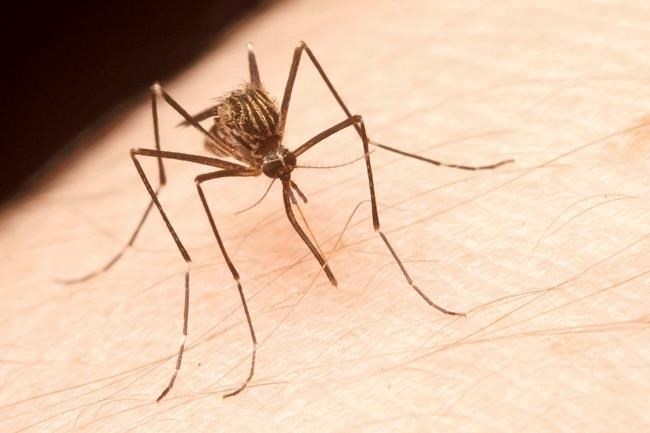
A mosquito is seen biting a person in this May 2015 handout photograph.
Image Credit: THE CANADIAN PRESS/HO-Sean McCann
June 20, 2020 - 2:00 PM
If you're looking for the bright side of this cool start to summer, count your mosquito bites.
There should be fewer than normal because mosquitos are apparently suffering from the cooler and wetter weather across the Southern Interior. That, however, may not last.
The Central Okanagan Regional District's Larval Mosquito control efforts have been underway since mid-April with the expectation that the irritating bugs will be more of a nuisance in the days ahead.
“The program is designed to control, not eliminate mosquitoes. From mid-April through September, our staff regularly sample over 200 known mosquito development sites," Duka Environmental Ltd. president Curtis Fediuk said in a press release.
"When we find mosquito larvae developing, we apply a bacterial larvicide that controls the larva before they become biting adults.”
In the Central Okanagan mosquitoes usually peak between mid-June and the end of July.
While the Regional District Mosquito Control program keeps potential mosquito development sites in check, there are steps residents can take around their property to help reduce hatches.
-
Remove any standing water sources and unused items that collect water such as old tires, plant pots or garbage cans - just a few millimetres of water is all that’s needed for mosquito larva to survive and hatch
-
Cover rain barrels with a screen so that mosquitoes can’t lay their eggs in the water
-
At least twice a week change the water in birdbaths, wading pools and pet bowls
-
Remove any water that sits in unused swimming pools and on swimming pool covers
-
Aerate water in ponds or add fish that will feed on mosquito larvae
During July and August, the program also controls larval development by monitoring, and if necessary treating approximately 11,000 roadside catch basins located along public roadways and residential streets. These are treated by technicians using scooters.
Residents can also protect themselves in a number of ways:
-
Use approved repellents
-
Wear loose fitting, light coloured clothing
-
Minimize activities near treed and bushy areas at dawn and dusk when adult mosquitos are most active
-
Repair and replace any window screens to help prevent mosquitoes from entering your home
Residents in the participating areas of the program (City of Kelowna, District of Lake Country, District of Peachland, Central Okanagan East and a small section of West Kelowna Estates in the City of West Kelowna) can report mosquito concerns by calling Duka Environmental Ltd. at 1-800-681-3472 or fill out an online form at rdco.com/mosquitoes.
To contact a reporter for this story, email Kathy Michaels or call 250-718-0428 or email the editor. You can also submit photos, videos or news tips to the newsroom and be entered to win a monthly prize draw.
We welcome your comments and opinions on our stories but play nice. We won't censor or delete comments unless they contain off-topic statements or links, unnecessary vulgarity, false facts, spam or obviously fake profiles. If you have any concerns about what you see in comments, email the editor in the link above.
News from © iNFOnews, 2020